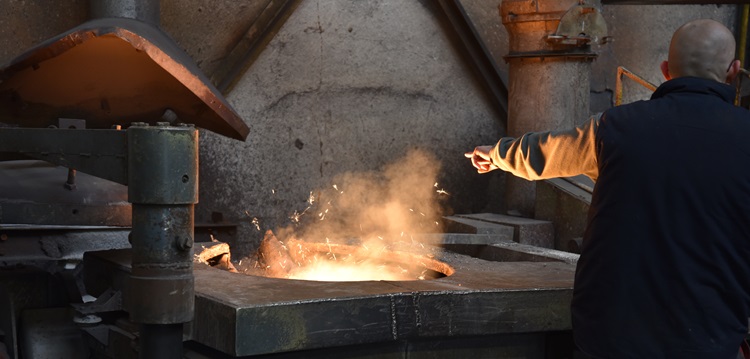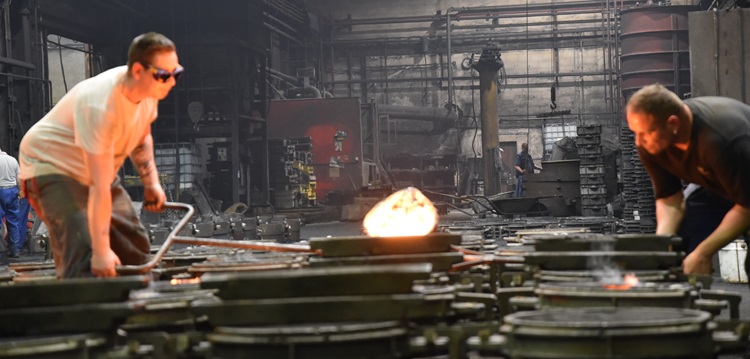Annual Report for the Year 2021
The business activity of the company SLÉVÁRNA, spol. s r.o. consists of foundry and pattern making. The foundry operations are a single independent unit, and as such, it has no separate branch offices. SLÉVÁRNA, spol. s r.o. - Company ID No. 45539367 has been a subsidiary of Slévárna Nové Město s.r.o., based in Prague - Company ID No. 05705011, since 2017.
- Slévárna Nové Město nad Metují
Although the beginning of 2022 is still marked by a sharp increase in the prices of all foundry commodities, trust in positive economic development is gradually being restored, which is reflected in the renewed demand for castings made of gray and ductile iron. On the other hand, the positive trend on the sales side in 2022 is overshadowed by the increase in material costs, especially for the production of liquid metal. Material costs and labor prices negatively affect the operations not only of our company but also of all our customers. In 2022, we also need to consider a renewed increase in the cost of waste disposal. The price for waste disposal, which arises from the filtration of air during the extraction of four technological units, furnace slag, and refractory linings of electric furnaces, significantly increased again in 2020. In 2021, the price for waste disposal resulting from the regeneration of molding sand also rose significantly.
Labor Costs.
The largest cost item remains labor costs. Labor expenses for 2021 exceeded 52% of total costs. Since our production relies heavily on a significant share of manual labor, which cannot be replaced with returnable investments in a short time, it is not possible to reduce the number of employees. Reducing labor costs is also not feasible by lowering the average wage. Stabilizing qualified employees is a guarantee of their expertise, without which it is impossible to manage complex technological processes, resulting in a quality casting with high utility value.
The fact that most of the castings produced by our company are not suitable for production lines and require a significant share of skilled manual labor for their production has been recognized by the vast majority of our customers. The prices of castings continue to rise with the increase in input costs, not by a uniform coefficient; the price increase for a specific range of castings is determined based on the share of skilled manual labor, as well as the shape and material complexity of the castings produced. Buyers of castings reluctantly accept higher selling prices because the number of foundries in the European region producing large castings through manual molding continues to decline, while there are still many customers for whom castings made of gray and ductile iron are indispensable. This provides a sufficient guarantee for the positive development of SLÉVÁRNA, spol. s r.o. in the future.

Beginning of 2022
Foundry Technology
SLÉVÁRNA, spol. s r.o. is equipped with technological facilities that enable the production of castings in small series or single-piece production of a wide range, from the simplest to the most complex shapes of castings. Manual production in small series, which predominates in our foundry, has a competitive advantage despite certain negatives, as the general decline in qualified workers willing to work in the foundry sector continues to decrease the number of foundries utilizing manual molding. Foundries equipped with molding lines find the production of large castings unsuitable, and small series production is financially disadvantageous for this type of manufacturing. Foundries from Eastern countries, such as Turkey and China, can deliver castings at a lower price; however, the delivery times from these foundries discourage customers who prioritize speed and quality over purchase price. Since our foundry focuses on producing castings with higher utility value in smaller series, foundries from Eastern countries do not threaten our competitiveness.
Our company does not hold an integrated permit. According to Law 76/2002 Coll., all foundries of ferrous metals with a melting capacity of more than 20 tons/day must have an integrated permit. The absence of an integrated permit currently does not pose a problem for capacity increases in production. Daily production has long been averaging 7 tons per day, which was even lower in 2020. The operation of SLÉVÁRNA, spol. s r.o. is located near residential areas in the city center. Although the foundry operation currently meets all legal environmental requirements, including emission limits for stationary pollution sources, it is necessary to consider the growing pressure from the residents of Nové Město nad Metují for increased environmental standards and improved living conditions in the future.
Although the beginning of 2022 is still marked by a sharp increase in the prices of all foundry commodities, trust in positive economic development is gradually being restored, which is reflected in the renewed demand for castings made of gray and ductile iron. The positive trend on the sales side in 2022 is, however, overshadowed by the rise in material costs for the production of liquid metal. Material costs and labor prices negatively affect the operations not only of our company but also of all our customers. In 2022, it is also necessary to anticipate a renewed increase in the cost of waste disposal. The cost of waste disposal, which arises from the filtration of air during the extraction of four technological units, as well as furnace slag and the refractory lining of electric furnaces, significantly increased again in 2020. In 2021, the cost of waste disposal resulting from the regeneration of molding sand also rose markedly.
Labor Costs
The largest cost item remains labor costs. Labor expenses for 2021 exceeded 52% of total costs. Since our production relies heavily on a significant share of manual labor, which cannot be replaced by returnable investments in a short time, it is not possible to reduce the number of employees. Reducing labor costs is also not feasible by lowering the average wage. Stabilizing qualified employees is a guarantee of their expertise, which is essential for managing complex technological processes, resulting in high-quality castings with significant utility value.
The fact that most of the castings produced by our company are not suitable for production lines and require a large share of skilled manual labor for their production has been recognized by the vast majority of our customers. The prices of castings continue to rise with the increase in input costs, not by a uniform coefficient; the rate of price increase for specific ranges of castings is determined based on the share of skilled manual labor and the shape and material complexity of the castings produced. Buyers of castings, although reluctantly, still accept higher selling prices because the number of foundries in the European region that produce large castings through manual molding continues to decrease, while there are still many customers for whom castings made of gray and ductile iron are indispensable. This provides a sufficient guarantee for the positive development of SLÉVÁRNA, spol. s r.o. in the future.

Beginning of 2022
Foundry Technology
SLÉVÁRNA, spol. s r.o. is equipped with technological facilities that enable the production of castings in small series or single-piece production of a wide range, from the simplest to the most complex shapes of castings. Manual production in small series, which predominates in our foundry, has a competitive advantage despite certain drawbacks, as the general decline in qualified workers willing to work in the foundry sector continues to reduce the number of foundries using manual molding. Foundries equipped with molding lines find the production of large castings unsuitable, and small series production is financially disadvantageous for this type of manufacturing. Foundries from Eastern countries, such as Turkey and China, can deliver castings at a lower price; however, the delivery times from these foundries discourage customers who prioritize speed and quality over purchase price. Since our foundry focuses on producing castings with higher utility value in smaller series, foundries from Eastern countries do not threaten our competitiveness.
Our company does not hold an integrated permit. According to Law 76/2002 Coll., all foundries of ferrous metals with a melting capacity exceeding 20 tons per day must have an integrated permit. The absence of an integrated permit currently does not pose a problem for increasing production capacity. Daily production has long averaged 7 tons per day, which was even lower in 2020. The operation of SLÉVÁRNA, spol. s r.o. is located near residential areas in the city center. Although the foundry operation currently meets all legal environmental requirements, including emission limits for stationary sources of pollution, it is necessary to anticipate increasing pressure from the residents of Nové Město nad Metují for enhanced environmental standards and improvements in the quality of life in the future.

To maintain good relationships with the surrounding community and the city, it was decided to continue the tradition of consistently reducing emissions and other negative impacts on the surrounding environment. The main goal is to reduce fugitive emissions of solid pollutants (primarily fine particulate matter PM2.5) in the operations of the foundry SLÉVÁRNA, spol. s r.o.
To this end, a request for funding was submitted for the implementation of an investment that, through the installation of best available techniques, will allow for further improvement of ecological parameters. In January 2019, the Ministry of the Environment approved and registered the provision of a grant for the purpose of implementing the project “Reduction of Emissions of SLÉVÁRNA, spol. s r.o.,” as part of the Operational Program for the Environment, priority axis 2 – Improving Air Quality in Human Settlements, specific objective 2.2 – “Reduce emissions from stationary sources contributing to the population's exposure to excessive concentrations of pollutants.” Unfortunately, due to unstable order volumes and a decline in orders, it was decided to cancel the investment for the reduction of emissions at SLÉVÁRNA, spol. s r.o. This investment would jeopardize the operation of the company with possible economic consequences.
Currently, the metallic unprocessed scrap (charge) often contains large amounts of dust that must be removed from the charge, which is a source of secondary dust emissions. Handling the charge material during unloading and loading into containers is accompanied by high dust levels and noise. Open storage on-site is a source of secondary dust emissions in windy weather. Prolonged storage of the charge in open areas during rain causes it to become damp and unsuitable for direct charging into furnaces. We will continue to face this problem until the company's economic situation improves.
Conclusion
The shortage of qualified labor represents a nationwide problem. So far, it has been possible to maintain the necessary core of qualified employees from the local area. However, it is necessary to supplement some production professions by recruiting foreign employees from EU countries. While recruiting core employees remains a priority, in case of necessity, it is not a problem to supplement the workforce with agency employees. The professional composition of the foundry's workers provides the assumption that revenues enabling the smooth financing of the foundry, including the realization of necessary investments, can be secured. The main task will continue to be maintaining the number of production workers in the necessary professional composition to achieve sufficient revenue and, thus, the required profitability.
The end of the negative economic development is anticipated at the beginning of the second half of 2022. Customers of castings, who temporarily reduced order fulfillment, expect a renewed growth in the sales of their products, which will have a positive impact on the improvement of the company’s economic situation.
In Nové Město nad Metují
March 30, 2022
- Radek Joch, Director of SLÉVÁRNA, spol. s r.o.


